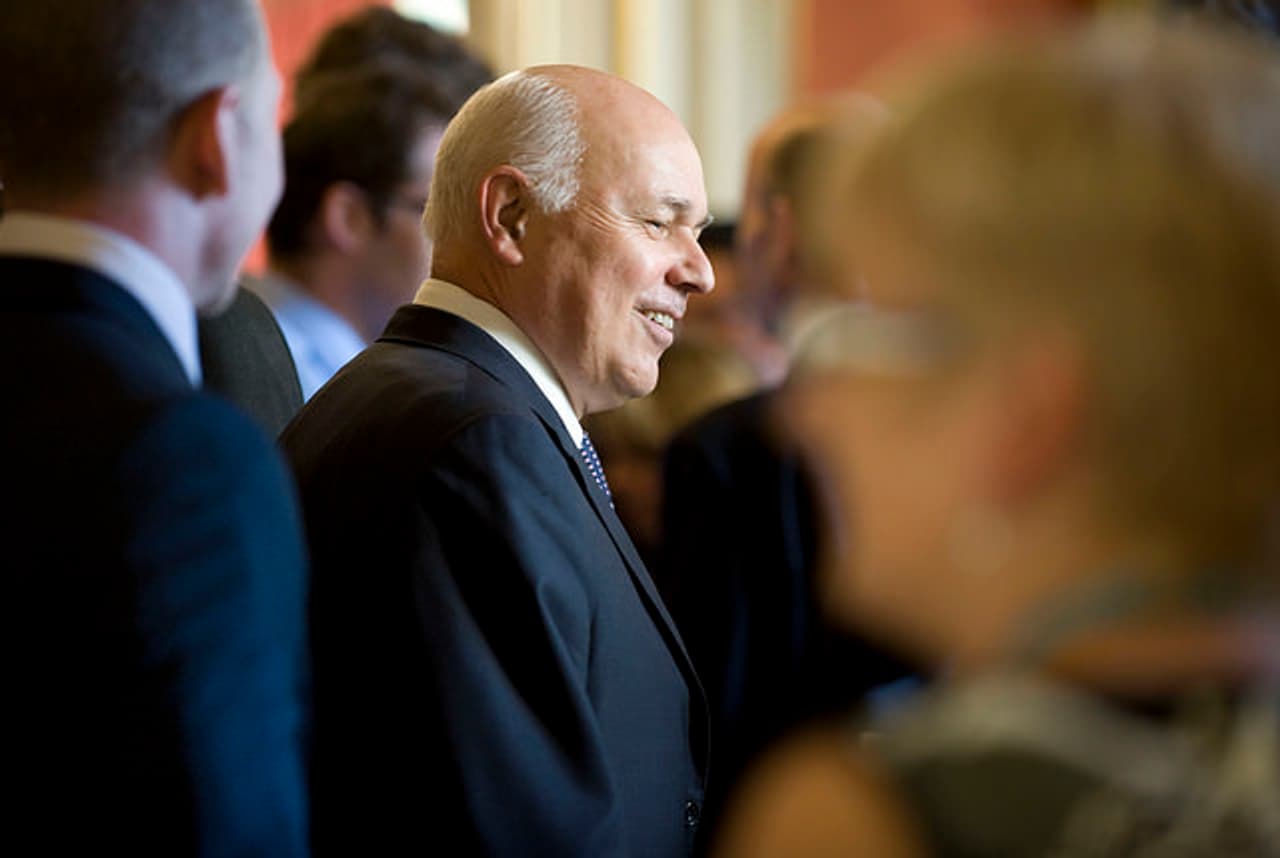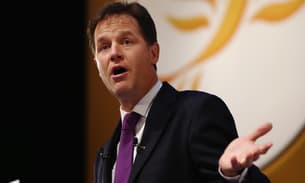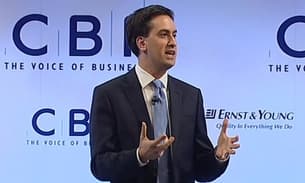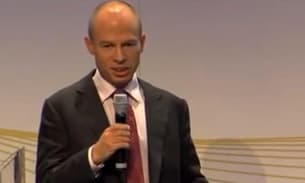
Doorstep lender hosted fair-priced finance champion Iain Duncan Smith at Tory dinner
Iain Duncan Smith by Cabinet Office/Flickr
The Work and Pensions Secretary, Iain Duncan Smith, dined with three executives of a doorstep lending company, CLC Finance at the Conservatives’ annual winter fundraiser in February.
The group enjoyed a “wide-ranging political discussion” with Duncan Smith on matters including Universal Credit, a spokesman for CLC Finance said.
Research by the Bureau also reveals that two of the directors who were sitting with Duncan Smith are members of a family firm that has given at least £28,500 to the Tories over the past three years. The first donation from this firm was recorded by the Electoral Commission in late 2011, just as pressure was mounting on the Government for tighter regulation in the high-cost credit market.
Donations may have been made before then of insufficient size to trigger an Electoral Commission disclosure.
Lender criticised for doorstepping retired couple
The three CLC Finance directors at the table were Philip Wilbraham, CLC Finance’s majority shareholder, and Dominic Wilbraham and Edward Klempka. CLC Finance’s accountant and another member of the Wilbraham family were also guests at the table.
Another guest was George Hollingbery, MP for Meon Valley in Hampshire, who is private secretary to Theresa May and has a particular interest in work and pensions and welfare reform. He is a longstanding personal friend of the Wilbraham’s family.
CLC Finance, which also sells Christmas hampers and shopping vouchers, was criticised in the press in 2012 for doorstepping a retired couple who had built up loans of £65,000. The Mirror also noted that CLC’s collection agents were paid on a commission-only basis and earned extra if a new loan was taken out before the old one was paid off, which critics said could encourage them to pressure customers into borrowing more than they could afford.
A spokesman for the Wilbrahams said the loans had been taken out before the Wilbrahams’ involvement in the business, which began in 2010, and had been written off in full following the Mirror article.
CLC Finance has not responded to queries about whether its agents are still paid in the way outlined by the Mirror.
When the Government’s crackdown on high-cost lenders was first discussed, it was thought likely that doorstep firms would be included. It was around this time that the Wilbraham’s family firm appears in Electoral Commission records as donating to the party.
A spokesman for the Wilbraham said it was “absolutely not the case” that the family firm had made a donation to the Conservative party with the intention of influencing government policy on the regulation of home credit providers.
“The Wilbraham family has been supporters of, and donors to, the Conservative party for over 30 years and the Wilbraham and Hollingbery families have been friends for over 40 years. The discussion at the fundraising event … was a wide-ranging political discussion including a discussion on the universal credit system,” he said.
He added: “Although the recent reforms introduced by the FCA to the payday lending industry do not extend to cover home credit providers such as CLC Finance, CLC Finance complies in full with these regulations and so it would be of no detriment to CLC Finance if such regulations were to apply to it.
For the same reason, CLC Finance would have no concern about home credit providers having been the subject of the government’s review of the industry.”
Hollingbery said: “To the best of my recollection – from what is now seven months ago – I did not discuss credit finance, welfare reform or party funding with any of the other guests seated at my table or anywhere else.”
Donations first recorded as pressure to reform high cost credit mounted
Papers filed with the Electoral Commission show that the Conservatives accepted a £10,000 donation from Wilbraham Securities LLP, a partnership whose members include Philip, Dominic and other Wilbrahams, on December 15 2011.
The donation could have been made at any point in the preceding three months – a period during which pressure was mounting on the government to crack down on high-cost lenders.
David Cameron’s office announced on December 7, that a code of practice on high-cost lending was under consideration and that a cap on interest rates had not been ruled out.

The Consumer Credit Association, the industry body for the home credit industry, was constantly lobbying during this time, telling its members in July 2012: “The CCA continues to ensure it is consulted on the various industry changes that are being discussed by government …. through its effective and steadfast lobbying, the CCA has been consulted at every stage.”
In that year it became clear that payday lenders – which take repayments direct from borrowers’ bank accounts – were the prime target for reform, although campaigners warned against omitting other high cost lenders, including home credit firms, from the crackdown.
In early April 2013 the Competition Commission published a report on home credit, which found consumers were losing out to the tune of some £35 million per year.
A few days later the Conservatives were recorded as having accepted another £10,000 donation from Wilbraham Securities.
In October 2013 the Financial Conduct Authority’s consultation paper proposed to exclude doorstep lenders from its definition of short-term high cost lenders to be affected by new rules.
The FCA operates as “an independent body separate from Government“. But it has confirmed that the Government provided “feedback” to the consultation.
Decision to exclude home credit “strange” and “unhelpful”
When the FCA proposed excluding doorstep lenders respondents such as the Financial Services Consumer Panel, an independent statutory body, set up to represent the interests of consumers in relation to proposed financial regulation, argued strongly against this.
“The panel does not see any evidence of why the proposed provisions for payday lending should not be rolled out across the credit sector as a whole,” it said, adding that differentiating payday loans from home credit loans was “strange” and “unhelpful”.
But on February 28 2014 the FCA confirmed that its definition of high-cost short-term lenders would not include home credit. As a result doorstep lenders have been excluded from all reforms of the market, including the proposed cap on the cost of credit.
Despite this, Duncan Smith told Parliament a month later in March that the Government was clamping down on doorstep lenders.
Asked what steps he was taking to promote financial inclusion, Duncan-Smith replied that credit unions were being expanded and that the Government was “clamping down on loan sharks and doorstep lenders who have taken advantage of vulnerable people for too long.”
The FCA has confirmed to the Bureau that it is researching the home credit market but has not started a formal review or investigation of the sector and cannot confirm that there will be one.
Damon Gibbons, of the Centre for Responsible Credit, said: “The FCA needs to impose a price cap in this sector if it is to properly protect some of our poorest households from these lenders. There is no justification from excluding door to door lenders from a cap.”
A further £8,500 donation from Wilbraham Securities was accepted by the Tories on June 30 2014.
Table plans shows debt collectors also present
The table plan for the February fundraiser seen by the Bureau indicates that debt collectors and the owner of another high-cost credit firm were also present at the dinner.
The plan put MP Liam Fox at a table with long-term Tory donor Henry Angest, who controls Everyday Loans, a firm that offers longer-term unsecured loans to people with low credit ratings.
In early 2013 Angest bought Debt Managers, a debt collection agency that offers repossession and bailiff services.
The company also purchases bad debt from other companies, which it then seeks to collect.
Last year Angest publicly challenged the government’s intention to cap interest rates on high-cost loans, stating: “I am, however, alarmed at the recent developments and rhetoric that have been aimed at restricting the free market.
“These have included wage control, caps on interest rates charged, limits on market share, regulating profitability, breaking up bank branch networks and raising the tax burden levied on the entrepreneurial classes.”
In March this year Angest donated £10,000 to employment minister Esther McVey, who is currently overseeing reforms to the welfare system.
The table plan also lists Paul and Selina Burdell, who founded and own Link Financial, a debt collection agency that was criticised by a judge in 2011 for hounding a debtor so much that it amounted to “a form of torture”. The judge set aside the £20,000 debt citing technical reasons and the debtor’s treatment.
In March 2014 the firm lost another legal case after the High Court ruled a clause in its terms and conditions was unfair.
The Burdells and Angest did not respond when asked if they attended the fundraiser.
Fox confirmed his attendance but said he could not remember if he sat at the same table as Angest.
Related story: The money pouring into a boom for consumer loans




